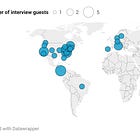Introduction - Luke Hu
This post is part of our AI6P interview series on “AI, Software, and Wetware”. Our guests share their experiences with using AI, and how they feel about AI using their data and content.
This interview is available as an audio recording (embedded here in the post, and later in our AI6P external podcasts). This post includes the full, human-edited transcript.
Note: In this article series, “AI” means artificial intelligence and spans classical statistical methods, data analytics, machine learning, generative AI, and other non-generative AI. See this Glossary and “AI Fundamentals #01: What is Artificial Intelligence?” for reference.
Interview - Luke Hu
I am delighted to welcome Luke Hu from China as my guest today on “AI, Software, and Wetware”. Luke, thank you so much for joining me today on this interview! Please tell us about yourself, who you are, and what you do.
Okay. Hi. Thank you. I am in Hong Kong, actually. And I've been dealing with the data for quite a long time. I'm currently a technical account manager for a company called KX, and we deal with AI softwares, and those are time series databases. Something called KDB I think people might have heard of. So my job is to help people to use this product effectively in their organization to deal with different issues. AI is a big part of it. I'm delighted to be here.
Great! Well, data is obviously the foundation of everything that everybody is doing nowadays with AI and machine learning. You really can't do it without data. And, obviously, when you get to the bigger data, then having the high-speed real-time databases becomes super important. So it's an important technology.
Yep. Indeed.
Have you worked with databases for quite a while, then, in your life?
Yep, I started out as a DBA [database administrator]. Working in investment bank at Morgan Stanley, dealing with mostly operational type of issues, follows on global type operations, highly automated environment. Then we did a lot of work in engineering, participating in the engineering process side of it to make sure things are streamlined, in terms of processing the data and consuming it.
And then I get into a trade capture environment where we capture high frequency trade data. Everything down from the applications layer, sending us the messages we’ll persist, that we'll route it to the right databases. And from that point on, we get into a different data mart and data warehouses.
So the whole process from capturing the data to consuming the data is something I've been kinda focused on quite a bit for about 7 years. Yeah. It's across regions. It's a very complicated environment in Asia here. We had seven jurisdictions at the time, probably more now, where we have different regulatory requirements here and different market hours, and different volatilities depend on different situations and different economic events. So it's probably by far the most complex environment, most dynamic environment to be managed at a central location.
So it's quite a challenge, and it's interesting. Like I said, data is a very important product, the machine learnings and the AI part of it. And yes, I've been dealing with a lot of those things for quite a while.
Alright, that sounds good. Tell us about your level of experience with AI or machine learning or analytics, whether you've used it professionally or personally? Or if you’ve studied the technologies?
Yeah. As things evolved, eventually, it's inevitable you'll get into this area where you start dealing with, in the early days, data mining, where you start exploring different algorithms, the cost ratings, the association analysis, and the neural network analysis, that kind of thing. And eventually get into a more mature setup, in terms of proper courses and proper tracks of learnings. And, yes, in the early days, I did explore the data mining discipline for a little while, and eventually applied it into my job on managing the database environments, with the unsupervised learning clusterings.
Now I got into an area where we'll learn about the data science for about 3 intensive weeks, actually a month, to be a data scientist, where you explore the different type of algorithms and regression models and use cases. So those are the extents of my exposures to machine learnings.
And recently got into a more generative AI type of mandate, where we targeted our product to sell in the market for sentiment analysis for financial record, financial trading, where you marry the hard data, that is the actual numbers from Reuters, from the trade, from the market data, and within market news, to process by generative AI to come up with a sentiment scoring. And for these things combined, to produce proper trade decisions, that sort of things.
That's really interesting. So thank you for sharing all that professional background. How about outside of work? Is there any software product or tool that you use personally that has AI or machine learning features? Like on your phone, or in your home or personal life?
Yes! It's been a lot of learning in this field. Things keep changing. You have to be up to speed with everything around you, including learning the product with my new roles and the new industry, the new trends and things. And inevitably, doing all these different research, you have to come across the power of ChatGPT. Ask them a question, it will give you a more concise, more consolidated summary of what's going on, sort of a white paper. That has been a great help for me.
Have you tried any of the AI tools that generate or manipulate any content other than words, for instance, images or music?
No, not yet. But, eventually, I will. for sure.
Can you share a specific story on how you've used a tool like ChatGPT that included AI or machine learning features? I'm wondering what your thoughts are about how well the AI features of those tools worked for you, or didn't?
Right. Learning the company product, sometimes I cross-check with what ChatGPT had to say. Sort of as a partner, “This is my understanding. Is it your understanding as well?” And then something I find it's not the same. And eventually, I reconcile that actually, I am right. ChatGPT is wrong. So the hallucination part of it has been kind of worrying, and interesting as well.
And there are instances where it went completely off the wrong track. So that's just something alarming. It's something we need to take a big grain of salt when we deal with these AI tools.
Have you tried tools other than ChatGPT, for instance, Copilot or Gemini or one of the others?
Nope, not yet.
Some people I know have been using the tools, not so much to help them write, but more to help them to do research and to investigate. And like you said, the risk of hallucinations or wrong information is one of the risks there. But is that something that you used it for? Have you used it to try to help you learn about a topic that you didn't already know?
Oh, I use it. I leverage it, big time. Yes. I think it's easier for ChatGPT, for the AI tool, to consolidate and summarize information for me at the level where I can understand and from there, dig deeper. So, yeah, I leverage it quite a bit, and hallucination part of it is interesting, yeah.
Are there any examples you could think of, of a specific topic where it gave you wrong information?
Yes. But it's very, very product-specific. Think I was asking “What does this thing do?”, and it’s telling me one way where it's completely off the track, it’s missing.
Let's say there are 4 mandates on a specific product. “You can set an attribute on a column of a table in KDB. And what are those four attributes for?” I asked ChatGPT. And ChatGPT gave me something, like, “There is no such thing as these 4 attributes. It's just one attribute. This attribute goes on to [something deeper, to some other things …]” From the get-go, it was wrong already. So that's when I started realizing, “Hmm, this is something I probably shouldn't lean completely all my weight on.” Yeah.
Fair enough. So I know a lot of people also use these AI tools for things like spelling and grammar checking, or translating, or drafting emails or reports. Some people use them for meetings, for taking notes in meetings, or summarizing. Do any of those uses come up in your day-to-day work?
Closest I can think of is when I do texting on my phone. And I can't bother to type it with my fingers, so I talk to it. And I know that it did correct my spellings and came up with exactly what I wanted said. But there are times when it kind of went a different way, which is interesting.
I think there must be some AI there as well, doing all these corrections and predictions of what I was going to say. So that is interesting and very productive as well.
Yeah. The voice to text technologies are interesting. There's a lot of jokes about different autocorrect fails! <laughter>
Indeed. Yes.
These are some good examples of when you’ve used different AI-based tools. Are there any situations where you avoid using AI-based tools for something, or for anything? And if so, can you share an example of when, and why you would choose not to use AI for that? Or do you not avoid them?
I don't avoid them, actually. I really like to leverage them as much as I can. And I want everything to be preprocessed to a point where I can just worry about the last bit of the most important information. I know there may be something, you know, not perfect, and something may get missed. But hopefully, at the end, when it gets to me for the last bit of information, I can make sense out of it, and get as much as I get out of it, and just move on.
I guess the only time I'll probably try to preprocess before the AI would do is probably trying to get to something that's really, really, really, like, really high-stake, which I think is quite limited. There's not that many things that's that high-stake, at least for personal use.
The work? Yes, work are very important. So on the work side of it, I do read every single email that I have. I don't know if there's any AI tool that will read emails for me and summarize things for me. If there is, I'll explore to use that. For now, I still read every email and everything, you know, messages that came along.
Yeah, I've talked to some folks that like using the Copilot features that are built into the Microsoft Office toolset, and they use them to summarize emails or to help them generate emails. There's a joke about: someone starts with a set of bullets, and they have a tool help them to generate a long email from it. And then on the other side, someone's saying, “Take this long email and summarize it into bullets for me!”
I'm the later one, for sure. I don’t want to get things complicated. Yes.
Yeah. So would you have any reservations about using AI-based tools for composing personal messages to family, or to friends? Or for writing on LinkedIn, with posts or comments or anything like that? Or cover letters, if you were looking for a new role in the future?
Oh, definitely. Yes. For that, I'll have to personally look at everything that's been written before I send it out. But do I use the tool? I probably would, but I definitely will have to be the gatekeeper to make sure things go out the way I want it. So, yeah, I will use the tool for sure.
One concern that we're hearing a lot about nowadays is where these AI and machine learning systems get the data and the content that they are trained on. And a lot of times, they've used data that people would put into online systems or have published online. And the companies aren't always very transparent about how they intend to use our data when we sign up for their services. I'm wondering what your thoughts are about companies that use this data and content for training their systems, and what your thoughts are about the ethics of it: whether they should be required to get consent, and if they should compensate people whose data they want to use for training.
Yeah. I think I look at these from a more systemic type angle where this eventually brings good to the society, as high up as possible. So I think if things get out of hand, with a double quote around it, I call it “out of hand” for the interest of the public, then we should have some scrutinies on that. For sure, we like to be able to predict or have a control of how things will go, what direction it would direct to.
So I think a good level of governance of how data is used is probably not different from what we used to have or have been having. And that is to make sure the interests and the productivity strikes a good balance there. It's just that AI came in. It's just a different tool. No different from all the other situations.
Of course, it's more powerful and far-reaching in its impact. But essentially, it's still the principal host. The new currency still needs to be regulated to the common good. That's just my personal belief.
Yeah. I think one of the concerns is: if they were scraping all of this information and using it, and basically giving it away as something that everybody could use and benefit from, that would be one thing. There's a bigger concern, I think: taking the text contents, the contents of books that people have put a lot of energy and effort into creating and publishing, and then having that stolen so they don't make any more profits, or can't make a living as a writer any more.
Or the same thing for artists, or for musicians, that their content is being taken from them, but they're not able to benefit from it. And a very few people are benefiting from it instead. And I think that's where the concern comes in. It's NOT just for the benefit of society as a whole. It's also extremely profitable for a very small number of people.
That's where some of the concerns, for instance, about intellectual property rights come into play. And I know that can vary from one region to another, the way people look at intellectual property. So curious to hear your thoughts about that.
That's exactly the point. I think this problem existed before as well. It's just that AI amplifies it, to a point where a decision needs to be made on governing these type of scenarios, usages. Yeah, so I think that needs to be looked at, and somebody needs to deal with this, making sure the interests of the individuals are covered. The productivity, the creativities are maintained, and the livelihoods are not being impacted. But if we are molding the society, or somebody has a vision of that transition to a different way, exploring other talents of individuals, then they should be managed as well, and there needs to be a transition.
So it's a change management process. It's a governing process. So I think these are all valid, and it’s something we’ve already constantly been facing all along. AI is just bringing it to the front and center. And it's something we need to deal with now.
As someone who's using AI-based tools, do you feel like the tool providers have been transparent with you about sharing where the data used for the AI models comes from? Or whether the original creators of that data consented to its use?
I don't think so. Well, I did see some quotes in ChatGPT giving me some links. But that's it.
As consumers or as members of the public, our personal data and content, pictures of us and such, have probably been used by AI-based tools or systems. Do you know of any specific cases that you could share where your data has been used?
Personally, my data has not been used. I'm not a very, I guess, public figure. No extreme importance for AI to get to me, I think, or for the public to be interested in me, or for anyone to be interested in me. So lucky or not, that's the situation right now.
Yeah, it's getting harder and harder to avoid, actually. There are things like public transportation systems and security systems, and there are local or online businesses that are all collecting our data. So it's getting harder to stay private.
Yeah, indeed. And I don't know how much of a privacy issue that's going to expose me, especially with the hackers and things going on.
Yeah. There's been some fuss lately about LinkedIn and Meta and other social media sites that are using our data to train their AI tools. Do you have any concerns about those sites using any of your posts or pictures, or any of the data about you that's in those sites?
Oh, yeah. Absolutely. I think, if we don't have a say on how that's used, then we will take the consequences of how that's used. And that consequences may be entirely to not just my benefit, but the entire society's benefit. So that needs to be transparent. It needs to be discussed. It needs to be governed. Absolutely.
Can you talk a little bit about what your thoughts are about a system that may be a control system that could govern this area?
Well, I think, on the legislation front, we could mandate certain things - what should be used, what should not be used, and what can or cannot be used. And they just have to comply to it, and with penalties. And I think that will be the first step. Or the first step probably would be bringing the transparencies out on the extent of the problem, and then, have a hearing about the solutions and perhaps some sort of legislations and then enforcements.
No different from how we deal with things in the past, these three steps, but, of course, with the flair of getting technology heavily involved in implementing those and the expertise as well.
I think what you're describing is in line with what the AI Act is aiming for. But making it work globally is quite a challenge. You know, these tools use data from places all around the world, and then they get used by people all around the world. And the different areas have different regulations, so it takes quite some work to get it all to work together.
It's going to be a challenge because the world doesn't really have a higher-up authority governing the entire world. There will be nations or parties using this as a weapon to go against each other because they want to be strong and to assure their securities and their economic interest. So it's a complicated issue, as with anything else. I think probably nuclear weapons will be a analogy to this. But that was a mutually-assured destruction type of proposition. For this AI thing, it will be probably more complicated. So it's not going to be easy for sure. Yep. Agree.
Has any company's use of your data and content ever created any specific issues for you, such as privacy or phishing or loss of income? And can you share an example?
No, I know nothing of their using my personal data to do any of those things.
Maybe an online shopping site that you've used?
Yes. Online shopping sites. There is a very, very prominent shopping site here, similar to Temu in the US, that's called Taobao, T A O B A O, in China here. And you can assure, the personal information you put in there, it's got leaked left and right and everywhere. I immediately got a lot of spam email after I shopped there, not just for my email, but also for my text messages. So my phone numbers got leaked out. My email got leaked out. So I don't know how they control these things and whether that was intentional or what. But, anyway, that's what I experienced. Not good.
Yeah. I just saw something just the other day where they were saying that Temu and Amazon and a few others make most of their money from selling our data, not from selling their products. But I don't think that's quite true. At least not for Amazon, it's certainly not true - they make more money from their cloud services.
Indeed.
Yeah. But the leakage of email addresses and phone numbers … I mean, with emails, at least, we have an option to maybe create some throwaway email addresses we can use for certain services. But with phone number, it's a lot harder to do that.
Indeed. Yes.
So you've been getting a lot of spam emails. At least one positive thing is, your email provider probably uses AI-based spam filters to try to intercept that for you?
Yes. I think I got those, so that's not too bad. But the spam texting messages, I kept getting it. Yeah.
Does your phone provider also try to flag spam calls or spam texts? I know mine does here. They've been starting to do that more, just within the past year or so.
Yes, I kinda noticed that too. There's always this message saying “Spam, yes or no?” And you can do something about that. So that's kinda cool.
Yep. So last question, and then anything that you want to add, we can talk about.
The public distrust of these AI and tech companies has been growing lately, and I think it's partly because we're starting to realize more and more just how they are using and selling our data, in ways that we didn't necessarily intend or want to sign up for. So what do you think is the most important thing that these companies could do to earn and to keep your trust? And do you have any specific ideas on how they could do that?
I think the industry should rally to come up with some sort of standard and comply to it, and show that they have complied to it. The standard should make things transparent, and designed to a point where they earn public trust, us giving the data on them. So that will be kinda cool. Don't know how that's gonna go or who's gonna push that, but somebody needs to do it. Because eventually, without the trust, there's always going to be these type of conversations, not just within the community, but within myself also. Whether I should do business with you or not. Whether I should give you the right information, to the point about giving the fake email addresses and fake phone numbers.
Is that productive overall? Is it productive for you and me? So those are the kind of things I think so many bigger companies should kinda get together and talk about. It's to their interest as well. And the government should play a role there as well, to make sure the interests of everyone are taken care of. That's my view.
Yeah. You make some really good points there about them being transparent about what data they got, how they used it, how they are working on it to prevent biases or to make sure that it's not creating harmful mistakes or hallucinations. All of that will go to our confidence, for us as consumers, on whether or not we choose to use them.
But the important thing, I think, is that we have to have a choice. And that we have to be thoughtful about which companies we choose to use or not, and which ones we choose to give our money to or not, for their services.
Right.
Is there anything else that you'd like to share with our audience, your thoughts about AI?
I think it's going to be a interesting journey that's coming, because this is affecting all aspects of our life. With the advent of technologies, even more so, these things will be done in sort of a real-time fashion now. Especially in my world, with tradings going on, where you need people dealing with hard datas, like the market datas, and what they call the type of L-one and L-two datas in the market, to do analysis, to do trading decisions. And, traditionally, they will hire analysts or interns to read market news and decipher that, and eventually come up with the recommendations of an action. And that takes days. But then, with these generative AI product, they can just process these informations extremely quickly.
So all of a sudden, you have these 2 sets of data that comes along and merge together. One is your market data, the hard data. The other ones are the soft sentiment type of data. And merge together and form drastically new paradigms of making trading decisions.
And you can imagine that can go into other areas as well, not just for trading, but also other type of decisions, important decisions as well. So with these technologies being employed in all spectrum of the work, then the effect of that is really amazing and unpredictable, to be to be honest.
Where decision based on sentiment, how big of the weight that is being carried going forward, and how fast it is going to be act upon, are all going to be very, very different now. So I don't know if it's such a positive thing. But it's a turbulent world, and it's going to be a lot of changes, and a change. How do we manage the change is going to be a challenge. And whether that needs to be governed, how fast of a decision you can make by the sentiment. Because the sentiment can change based on false information as well. And if false information give you the best sentiment, and all of a sudden things went haywire to a point you cannot revert that, because now all of a sudden, you think that information was not false anymore. So what to do then?
So these are all the big challenges that's coming along, with the advent of the generative AI and automation of that. So that's something I thought would be kinda interesting to point out.
Yeah. It's really interesting for me to hear about what you're seeing with the use of sentiment analysis and the generative AI tools in the finance world, Luke. So thank you very much for sharing that. And thank you again for making the time to share your experiences with us in this interview. I appreciate it.
You're welcome. Thank you very much.
Interview References and Links
Luke Hu on LinkedIn
About this interview series and newsletter
This post is part of our AI6P interview series on “AI, Software, and Wetware”. It showcases how real people around the world are using their wetware (brains and human intelligence) with AI-based software tools, or are being affected by AI.
And we’re all being affected by AI nowadays in our daily lives, perhaps more than we realize. For some examples, see post “But I Don’t Use AI”:
We want to hear from a diverse pool of people worldwide in a variety of roles. (No technical experience with AI is required.) If you’re interested in being a featured interview guest, anonymous or with credit, please check out our guest FAQ and get in touch!
6 'P's in AI Pods (AI6P) is a 100% reader-supported publication. (No ads, no affiliate links, no paywalls on new posts). All new posts are FREE to read and listen to. To automatically receive new AI6P posts and support our work, consider becoming a subscriber (it’s free)!
Series Credits and References
Audio Sound Effect from Pixabay
Microphone photo by Michal Czyz on Unsplash (contact Michal Czyz on LinkedIn)
If you enjoyed this interview, my guest and I would love to have your support via a heart, share, restack, or Note! One-time tips or voluntary donations via paid subscription are always welcome and appreciated, too 😊

















